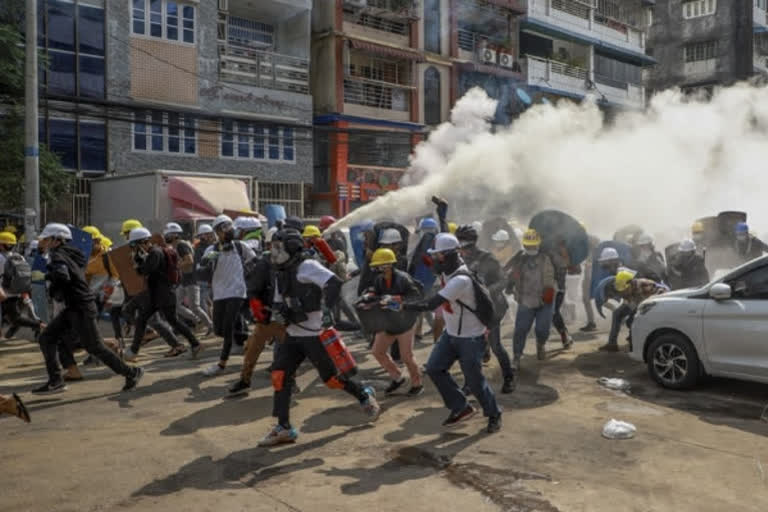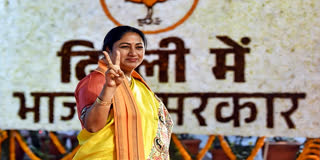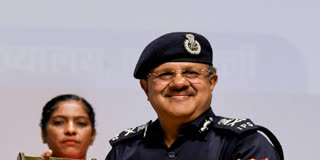Pro-democracy leaders mobilise fighters, Myanmar stares at civil war
India’s eastern neighbour is in turmoil as civilians and armed fighters of various ethnic groups are readying for a fight with the ruling Myanmar junta, writes senior journalist Sanjib Kr Baruah

New Delhi: The pro-democracy movement in Myanmar, spearheaded by the ‘Committee Representing Pyidaungsu Hluttaw’ (CRPH), has sought military services of 10 to 20 able-bodied men from each village from across the country with the aim of forming a federal army to combat the ‘Tatmadaw’ (Myanmar military).
“A call has been issued to every village to prepare 10-20 youths to form the federal army. Myanmar is definitely facing a civil war situation. The call for mobilization was issued by the CRPH on Thursday night,” K Vanlalvena, Rajya Sabha MP from Mizoram, told ETV Bharat on the phone.
“A lot of support of all kinds including funds is pouring in from across the world to help the pro-democracy movement in Myanmar. At this rate, the ‘Tatmadaw’ won’t be able to fight even for a month,” the Mizo MP, said after speaking to top CRPH political leaders in Myanmar.
There is a lot of sympathy and support for the Myanmar’s pro-democracy movement in Mizoram and parts of Manipur. Many communities from Mizoram and south Manipur share common ancestry with people from the Chin state in Myanmar which borders the two Indian states. As a result, there is overwhelming people-to-people contact with close relatives separated by the international but porous border.
Also Read: Know Myanmar Army General who triggered the coup
The main face of Myanmar’s ‘Spring Revolution’, Dr Sasa (who goes by one name) also hails from the Chin community.
Fearing persecution, hundreds of Myanmarese citizens, including government officials, have crossed the India-Myanmar border to enter Mizoram ever since the Tatmadaw staged a coup on February 1.
Media has reported of many ‘Tatmadaw’ soldiers, policemen, fire service personnel and other government officials who have refused to report for their duties responding to a CRPH call for civil disobedience.
Contrary to popular notion, it may not be a difficult task to quickly organize a federal army as Myanmar has been fertile ground for numerous insurgencies for the last seven decades. Officially called ‘Ethnic Armed Organisations’ (EAOs), these outfits are organized along ethnic lines with their demands ranging from self-determination and complete independence to enhanced autonomy.
“Now for the first time ever, all these EAOs are on the same side as the civilian government and together they are opposed to the Tatmadaw,” Vanlalvena said.
Also Read: China piqued on 'secret Kunming-Yangon night flights' report
While the politically dominant community in Myanmar is the ‘Barmar’ (Burmans), the insurgent outfits are found across the length and breadth of the country. Some of these insurgent groups are of Shans, Kayens, Kachins, Rakhines, and Chins that have a ready crop of volunteers ready for military service at any given point of time.
According to the CPRH figures, as of Thursday (March 18), 217 civilian protestors have been killed by the military junta from February 1 onwards, 2,191 have been arrested, charged, or sentenced while 1,872 people have been actively persecuted.
Interestingly, earlier this week, the CRPH had supported the right to self-defence on part of the people. It had said: “According to the provisions on Right to Self-Defense of Chapter 4 of the current criminal procedures (penal code), the people have the full right to defend themselves or others according to the law if unlawful military coup council or their chain of command have issued orders to the armed organisations which are no longer civil servant or public servant or their lackeys or those who want the interests of this council. In addition to fundamental human rights, people must protect their right to life.”
“The committee hereby declares that the responses by means of self-defense according to the law by anyone either individuals or ward/village community group or groups according to the areas or townships, shall not be considered as criminal acts.”
The genesis of the February 1 coup lies in the electoral verdict that voted overwhelmingly in favour of the Daw Aung San Suu Suu Kyi-led National Democratic League (NLD) in November 2020.
The NLD bagged 396 seats of the total 476, while the junta-backed Union Solidarity and Development Party (USDP) got just 33.






